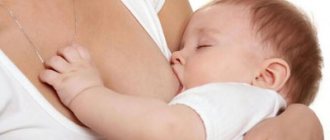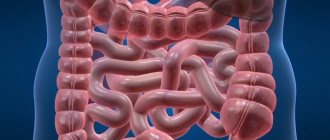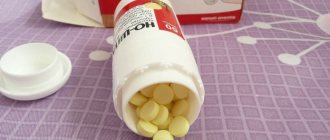Breastfeeding a baby is a responsible and exciting time for a young mother. Not all medications can be used to treat diseases and migraine attacks, since many of them negatively affect the baby’s development. A remedy for headaches during breastfeeding should be chosen taking into account the compatibility of lactation and the drug. Before using the medication, you should carefully read the instructions.
Origin of headaches
The causes of migraine attacks in a nursing mother can be different. Before pregnancy, many women did not even encounter such a problem, but lack of sleep, worries about the baby, and disruptions in diet have a detrimental effect on her health.
Among the main causes of headaches in a young mother are:
- overexertion, most often associated with constant stress and lack of sleep;
- vascular diseases: hypotension or high blood pressure, disorders of the vegetative-vascular system;
- migraine or increased sensitivity to weather changes, climate change;
- osteochondrosis of the cervical-collar area;
- postpartum mental disorder;
- prolonged stay in an unventilated area;
- hormonal changes;
- poisoning: household chemicals, alcoholic drinks, carbon monoxide;
- consequences of ENT diseases or flu, colds;
- strict diet (the amount of glucose in the blood plasma decreases, brain vessels dilate);
- abuse of certain substances or their sharp exclusion (coffee).
Headaches and cramps during breastfeeding can overshadow the joy of motherhood, but knowing how to treat such attacks, a woman can quickly get rid of the ailment and fully care for her baby.
Causes of headaches in nursing mothers
Experts know over 200 causes of headaches. Young mothers:
- lack of sleep;
- are in a constant state of stress;
- overworked physically and mentally.
Taking care of the baby takes a lot of effort and time, the baby needs to be fed by the hour, and needs to get up at night. The woman has no time or desire for anything else, apathy and frequent headaches appear. This is a completely natural phenomenon that disappears after the woman gets enough sleep, rests and walks in the fresh air.
But what to do if the pain does not go away? It is best to consult a doctor. Often the cause of headaches during lactation in a woman who does not lack healthy sleep and rest is:
- Migraine. If you have throbbing in any part of your head, most often in your temples, then it is a migraine. The reason for it during breastfeeding is constant lack of sleep, stress, and fatigue. But, unfortunately, it’s rare to get rid of a migraine just by getting a good rest. Rest had to be regular and complete, and young mothers can hardly boast of this. Sometimes migraine occurs against the background of nervous disorders and when the tone of blood vessels is disturbed.
- Hypertension. High blood pressure is a common cause of headaches.
- Poisoning. In this case, pain in the head occurs against a background of nausea, stomach cramps and vomiting. It is best to call an ambulance, but before it arrives, you can try to rinse your stomach yourself with plain water (you need to drink at least 1.5 liters over 10-15 minutes).
If a headache is accompanied by a runny nose and general muscle weakness, then most likely we are talking about an acute respiratory infection or acute respiratory viral infection. To avoid infecting the child, the mother should seek medical help. Most likely, you will have to stop breastfeeding for the duration of treatment. The only way out of the situation is to use medications that are compatible with breastfeeding. There are few of them, but they still exist.
Treatment highlights
Constantly disturbing painful spasms require a young mother to have a correct daily routine and be attentive to her health.
Breastfeeding women should adhere to the following basic rules:
- Have a full rest. Poor sleep and fatigue are the main causes of painful syndrome and decreased breast milk production. Therefore, at the first opportunity you need to relax, sleep, enjoy the silence.
- Remember what diseases bothered you before pregnancy. After the birth of a child, migraine attacks and spasms due to osteochondrosis and high blood pressure may return. If the cause is established, it will be easier to deal with unpleasant discomfort.
- Use headache medications sold at pharmacies. During attacks, nursing mothers think that traditional medicine recipes do not pose any threat to the baby, but this is not so. Alternative medicine cannot guarantee that a certain remedy will not affect the development of the child or lactation (hay, aloe, sage herbs). When breastfeeding, it is much safer to take a pill that has been clinically tested.
- Therapy should be started immediately. Unpleasant discomfort cannot be tolerated. There are many harmless, effective medications that can help get rid of headaches.
- Use only safe drugs. Before taking the product, you need to make sure that it can be used while feeding. To do this, you should carefully read the instructions.
Most modern medications are prohibited for use against headaches during lactation and pregnancy. Using them without a doctor's recommendation is dangerous for the child. For example, analgesics can cause pathologies in kidney development even after one dose.
Headache medications compatible with breastfeeding
Not all painkillers used in everyday life are safe for the baby; many of them pass into breast milk, which is highly undesirable. Naturally, there are no completely safe medications, but you can try to minimize the risk. Drugs compatible with breastfeeding include:
- Ibuprofen. Allowed during breastfeeding only on the recommendation of a doctor. Combines anti-inflammatory and analgesic properties. A single dose of ibuprofen tablet during a severe headache will not cause any harm; only a small part of the substances it contains ends up in milk. With the help of an ibuprofen tablet, severe pain that has been bothering you for a long time goes away. If the medication needs to be taken for more than 1-2 days in a row, breastfeeding is interrupted.
- Sumamigrain. A selective drug belonging to the group of triptans. This painkiller is eliminated from the body 12 hours after administration. It passes into breast milk, but experts do not consider it dangerous; the amount of sumamigren is negligible. A mother can protect herself and her baby by starting feeding only 1 day after taking the sumamigren tablet.
- Paracetamol, Panadol and Efferalgan. Most often, Paracetamol is used for colds, but treatment for headaches can also be based on it. Drugs such as Panadol and Efferalgan (available in tablet form) are considered safe. They contain the same substances as paracetamol. Panadol is sometimes indicated even for newborns, so during lactation a young mother can safely take it.

An effective medicine for headaches during breastfeeding is the drug "Mig". But it has a lot of side effects, so Mig cannot be called safe for constant use during lactation. Most likely, the doctor will recommend stopping feeding.
Homeopathy
Experts in the field of treating diseases with homeopathic (alternative) medicines argue that any disease is secondary and comes from the innate characteristics of the human body.
Helpful information
Homeopathic medicines are designed to improve metabolism, which practitioners in this field associate with most diseases.
The cause of pain is not important for homeopathy, the main thing is to determine:
- where does it hurt;
- when it hurts (after eating, during sleep, in the morning, in the evening);
- what kind of pain (pulling, throbbing, sharp);
- what caused;
- what symptoms accompany.
Homeopathic medicines have practically no contraindications, and there is no addiction after them. The toxicity of such drugs is also very low. The best homeopathic remedies for headaches are:
- Belladonna;
- Alice;
- Coffee.
Despite the declared safety, homeopathic medicines are still best taken after consultation with a doctor.
Approved medications for lactation
A nursing mother may experience headaches from time to time due to fatigue and inadequate rest. Drugs approved for use during lactation and pregnancy help stop attacks. Such medicines include:
- the drug "Ibuprofen";
- Paracetamol;
- medicine "No-shpa";
- medicine "Ketorolac";
- Naproxen tablets.
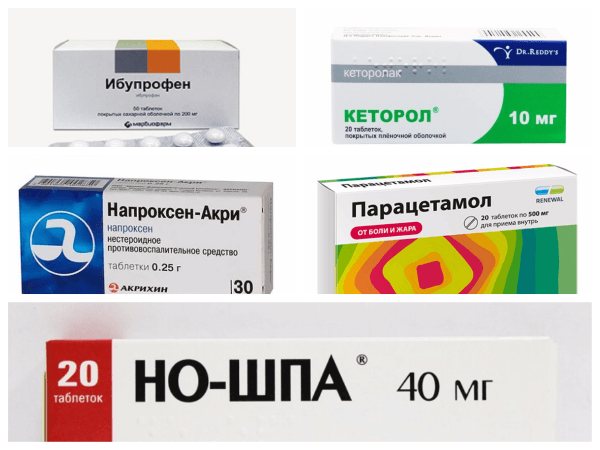
Allowed
The drug "Ibuprofen"
The medication relieves spasms half an hour after administration; after 3 hours, the active substances are completely eliminated from the body. If the medicine is taken once, you can feed the baby right away. From 3 months, Ibuprofen can also be given to a child (at a fever). Possible analogues: “Imet”, “Ibuprom”, “Nurofen”.
Paracetamol
This drug is most often recommended for nursing mothers. It effectively eliminates spasms, is safe for babies and has a small number of side effects. The drug has been used for many years in the treatment of migraine attacks.
For adults, Paracetamol is available in the form of rectal suppositories, capsules and tablets. It is allowed to use no more than 1 g of the active ingredient at one time, 4 g per day. It is presented in the pharmacy under the names: “Panadol”, “Efferalgan”, the drug “Rapidol”.
Medicine "No-shpa"
The remedy is indicated for headaches and migraine attacks in nursing mothers caused by vascular spasms. This is the only drug that has a rapid antispasmodic effect. Taking pills is permissible only if the patient is sure of the origin of the pain syndrome or when an anti-inflammatory non-steroidal drug has not brought relief.
Medicine "Ketorolac"
In the pharmacy it is most often presented under the names “Ketalgin” or “Ketanov”. According to the instructions, mothers and pregnant women should not take it for headaches. But most pediatricians do not prohibit its short-term use.
Naproxen tablets
Non-steroidal anti-inflammatory drug. According to the instructions, it is compatible with lactation, this confirms that you can drink it without fear (for severe migraine attacks, spasms). Safe dosage is 200-500 mg 2 times a day.
If you have any doubts about choosing a particular drug, it is better to consult a pediatrician and find out from him how to get rid of headaches and not harm the child’s health and development. Many medications are dangerous for infants.

Need to consult a pediatrician
Why does my head hurt? Causes
There can be many reasons why a mother may develop headaches. It happens that before the birth of a child, a woman almost did not know about the existence of such a problem, but regular night awakenings, nutritional disruptions and constant worry about the baby have a detrimental effect on her health. Let's highlight the main reasons why a headache may occur:
- tension pain - most common and associated with lack of sleep, stress, etc.;
- vascular problems: hypertension or hypotension, vegetative-vascular dystonia;
- migraine attacks;
- weather sensitivity;
- osteochondrosis of the cervical spine;
- postpartum depression;
- reaction to weather conditions: exposure to cold wind or heat;
- long stay in a stuffy room;
- hormonal disorders;
- intoxication (alcohol, household chemicals, smoking, inhalation of carbon monoxide);
- a consequence of ARVI or diseases of the ENT organs (when the paranasal sinuses become inflamed);
- fasting (leads to a decrease in blood sugar levels and dilation of brain vessels);
- taking certain foods or abruptly giving them up (coffee).
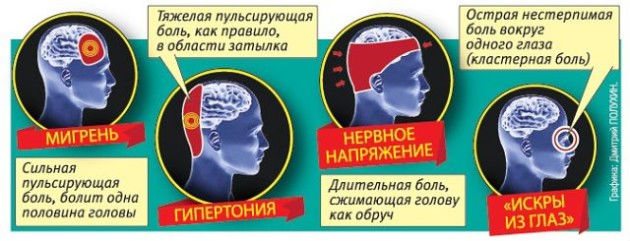
This is not a complete list, because there are from 40 to 50 reasons that cause a woman to suffer from headaches. I am glad that in most cases the same drugs approved for lactation can help.
Prohibited drugs
Some medications should not be taken while breastfeeding, as they contain active ingredients that are harmful to babies.
The following medications should not be used during lactation:
- "Analgin" - helps to quickly relieve spasms, but is prohibited when feeding. The drug has a toxic effect on blood, milk, and disrupts kidney function and hematopoiesis.
- Potent analgesics - “Pentalgin”, the medicine “Sedalgin”, that is, all medications ending in “gin”.
- "Citramon" is one of the popular medicines containing substances that have a toxic effect on a nursing woman and an infant. The medication contains caffeine and aspirin, which stimulate the nervous system and negatively affect the activity of the baby’s liver and brain.
- Aspirin should not be used for the same reason as the drug Citramon. The medicine destroys the baby’s brain and liver cells, negatively affects blood vessels, and can cause ulcers in women.
- Painkillers containing barbituric acid, caffeine and codeine. Acid inhibits the functioning of the nervous system, caffeine disrupts the baby’s sleep, as it has a stimulating effect. Codeine is a narcotic element that causes oxygen starvation.
- Potent medications containing ergotamine. The substance causes nausea, convulsions, and vomiting in infants.
Headache is a fairly common occurrence among women who breastfeed their babies. But the choice of medications should be approached with caution so as not to harm the child.
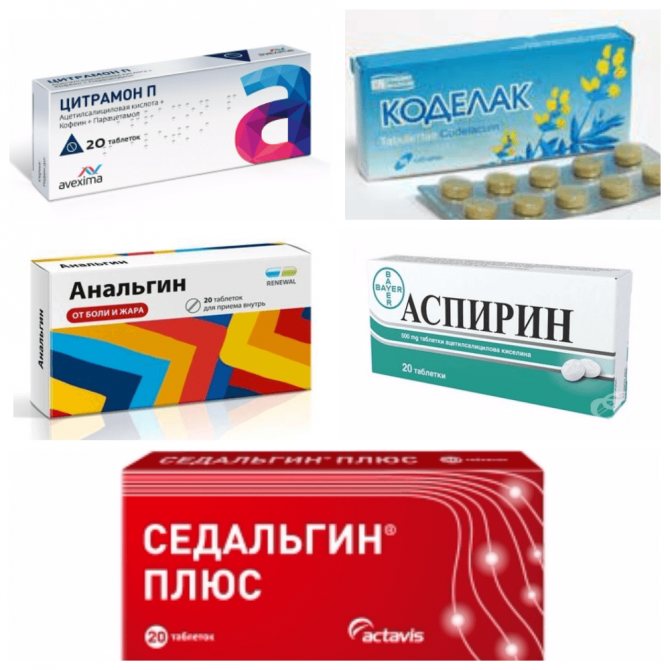
Prohibited during lactation
Contraindications
Since drugs of different pharmacological groups are used to relieve a headache attack during hepatitis B, contraindications to their use are mainly individual. But there are also general restrictions on the use of funds:
- individual intolerance to the components of the drug,
- ulcerative-erosive processes in the digestive system,
- kidney failure,
- pathology of the heart and blood vessels,
- bronchial asthma,
- functional liver disorders,
- diseases of the hematopoietic system,
- bleeding disorder,
- lactase deficiency,
- malabsorption in the small intestine,
- asthmatic component when taking medications of different groups.
Hypertension and migraine attacks
If the cause of painful spasms is high blood pressure, then normalizing it will help eliminate them. Hypertension is a complication after pregnancy or an exacerbation of a pre-existing disease. Such a pathology requires immediate treatment. Isolated cases of hypertensive crisis can be relieved with Anaprilin, Dibazol or Papazol.
Migraine attacks are difficult to endure; they can last from one day to 2-3 days. It is necessary to purchase them. Sumatriptan is prescribed for headaches and migraines while breastfeeding. After use, the active ingredients in milk are concentrated in small doses, but pediatricians recommend not breastfeeding for 12 hours after use.
With constantly recurring attacks, you will most likely have to give up breast milk and begin full-fledged treatment with Sumatriptan and other drugs.
Prohibited drugs
Many medications that we are used to taking in case of headaches are strictly contraindicated during breastfeeding.
Analgin
Some are accustomed to escape from headaches with Analgin, but it is not compatible with breastfeeding, because it has a depressing effect on the human nervous system and can provoke the development of agranulocytosis. Scientific studies have shown that those who often resort to these pills suffer from kidney damage and decreased immunity. Today, many countries around the world have already abandoned its use, although it is still popular in our pharmacies.
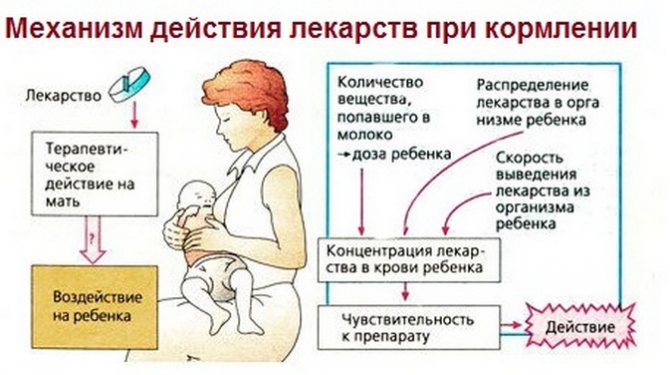
Even though no more than 1% of the drug passes into breast milk, Analgin is still a potentially dangerous drug for babies. Therefore, if you take it, then only as a last resort, when there is nothing else and it is simply impossible to endure the pain. In this case, the maximum permissible daily dose is 1 g, which is equal to 2 tablets.
It is worth noting that analgin is present in such combination drugs as Tempalgin, Pentalgin, Baralgin, Baralgatex, Spazmalgon, etc.
Citramon
Such tablets contain a combination that is very undesirable for mothers during breastfeeding:
- Aspirin.
- Paracetamol.
- Caffeine.
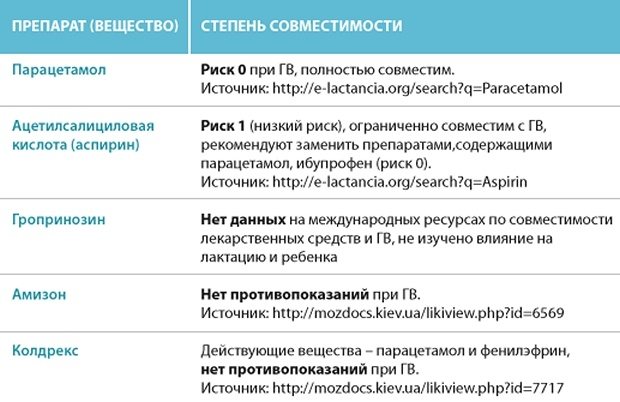
Of these substances, the most dangerous is aspirin (acetylsalicylic acid). This medicine is not suitable for use by children under 15 years of age. When used in case of a viral infection, the child may develop toxic liver damage. Acetylsalicylic acid can negatively affect the gastric mucosa and provoke the development of ulcers.
If you take just 1 tablet, of course, nothing bad will happen, but this should only be done if there is no suitable alternative at the moment. In this case, you will have to skip 1-2 feedings.
Secrets of home therapy
Aromatherapy allows you to quickly get rid of headaches during lactation. All you need to do is inhale the scent of essential oils or apply a little onto your body. It is better for nursing mothers to use essential oils of lavender, mint and ginger.
Alternative medicine recommends using herbs to relieve pain. But before using them, you should consult your pediatrician and make sure they are completely safe.
Prevention is the best remedy against headaches. This is especially true for breastfeeding women. Therefore, young mothers should adhere to proper nutrition, monitor their daily routine, walk in the fresh air as often as possible, and get proper rest. Following these simple rules will allow you to stop the development of migraines in time.


